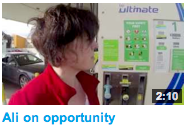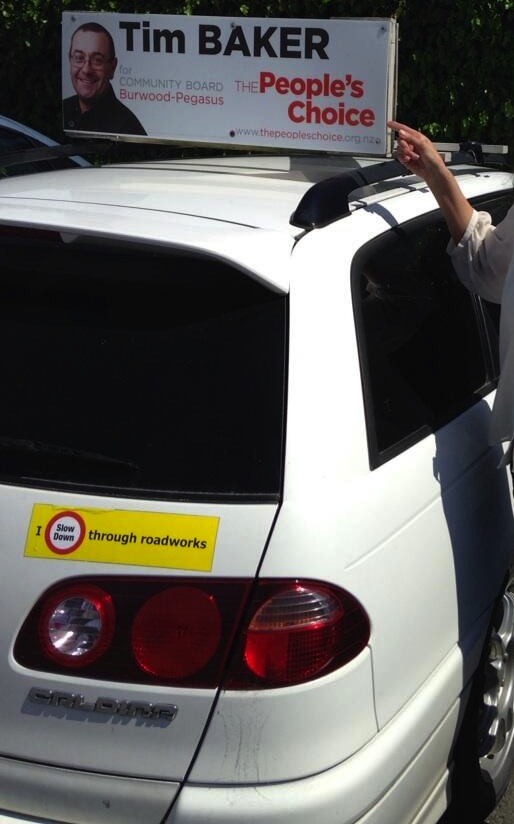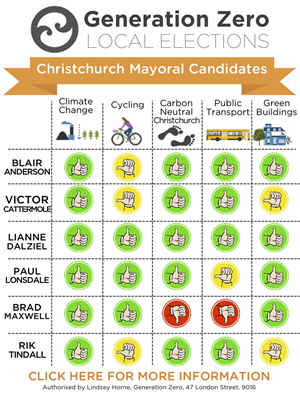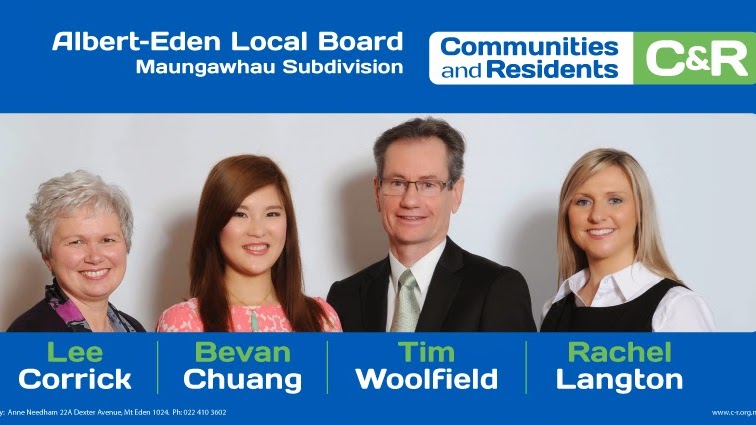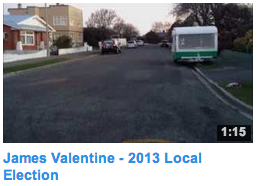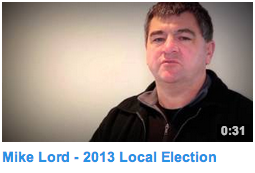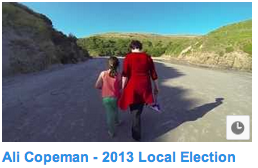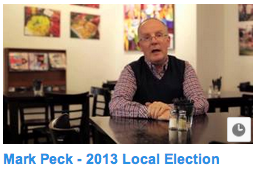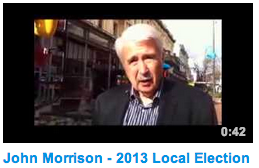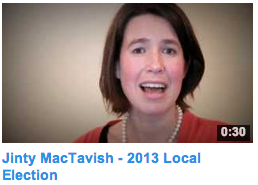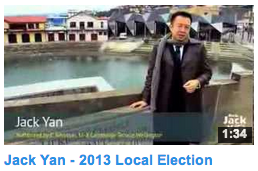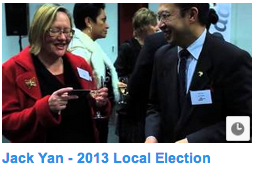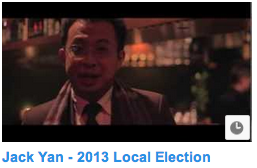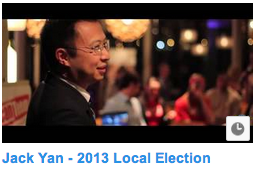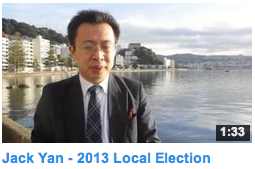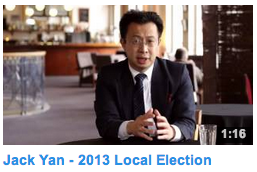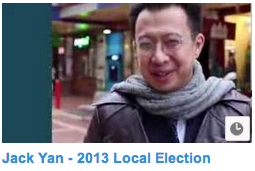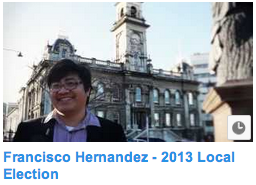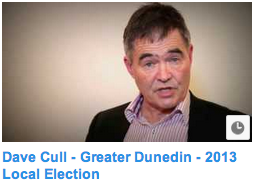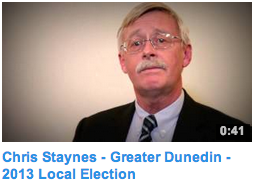Hayley Robinson & Sridhar Ekambaram – 2013 Local Election
Source: WCC Watch
Transcript:
[TITLE] Hayley and Sridhar: Talk Cycling in Wellington
[Hayley Robinson] Hi I’m Hayley Robinson and this is –
[Sridhar Ekambaram] I’m Sridhar Ekambaram. We are both new faces in Wellington, Western Ward. Oh, no we are both new faces in Onslow-Western Ward.
[H] Um today we’re gonna talk about cycling um which is something we’re both really interested in even though I don’t cycle and Sridhar is a cyclist um we both think it’s really important for Wellington.
[S] Yes it is um cycling is going to be the future of transportation in this country, not just in this country but also rest of the world um because of rising oil prices um looming fear of peak oil and also growing debt crisis, people [intelligible] to switch to cheaper modes of transport and cycling is one of them.
[H] I certainly agree that um that cycling can be cheaper. I have a slightly different view from Sridhar in that, um my view is that within ten years time we are going to end up with um electrical vehicles that are actually cheap enough for the average family to buy and so this is going to mean that our current congestion issues aren’t necessarily going awa- going to go away, um even with peak oil, um and that actually also means that cycling is important because the more people that we can allow to cycle, and its- and you want people to have a choice, more people we can allow to cycle then the more room there is for those of us who are driving our cars. Um there are some people who for driving there car is not a choice, whether it be because of a disability or because they have um little kids um or in my case I used to work way out in Naenae College and um it would have taken me about three hours to get from Karori um to there if I was taking the train and walking and so forth.
[S] I agree um not everyone can cycle but the thing is there are a lot of people who can cycle and you don’t have to cycle always you can cycle where possible and where not possible you can replace it car or public transport. Um but benefits of cycling is not just in transportation but also health and the environment-
[H] Absolutely, yup.
[S] -and again if you look at the growing obesity crisis, overweight problems cycling’s again a great form of exercise so, yep it helps, it’s a-
[H] So it’s good for Welligntonians on, on lots of fronts.
[S] It’s, there are a lot of benefits of cycling and not just one angle but several angles and cycling should be encouraged. Europe has gone a long way in getting people to cycle.
[H] Oh I know.
[S] It’s-
[H] Some of European cities are absolutely amazing.
[S] It’s amazing, and not all European places but most of Europe has done lots for cycling and-
[H] And that’s that infrastructure that they have and I think that’s what Wellington’s missing because um you were saying-
[S] It’s a safe cycling environment yes.
[H] Exactly so it’s that, it’s not just the sa- it’s a safety factor but it’s also making it an option in terms of having the infrastructure isn’t it?
[S] Yes.
[H] Um now you’re saying that it’s important in lots of ways and I think it’s actually important for our economy and promoting Wellington as well, um the Mayor had a meeting the other day and the Council were talking about um how the, the latest, one of the latest craze, the new golf is apparently mountain biking um and, and I couldn’t agree more I mean the more people , lot’s of people are getting into cycling and Wellington is already at least partially recognised as a great place to come to mountain bike and I think that’s something that we need to be promoting through Destination Wellington and various other avenues.
[S] Um cycling is also very good for the economy because if you look at latest studies, cities which have had cycling facilities around businesses, they actually seen an [intelligible] business, and there are, there is a study, hold on not one, plenty of studies which actually say um the cyclist actually save a lot of money-
[H] Yep.
[S] -and that’s money-
[H] They spend the money you mean?
[S] -yes they can spend-
[H] They spend it in businesses.
[S] -in the business, just for a cup of coffee or some-
[H] Yup.
[S] -or some retail therapy buying big ticket items-
[H] Yea and that’s part of that whole infrastructure thing, um people think about cycleways but it’s not just the cycleways it’s also the bike stands um bike carousels which is like big parks um you know having everything in place and particularly outside businesses because um as someone who’s got a business focus I know that a lot of businesses talk about being concerned that if car parks are taken away that then that will, they will lose that convenience business people popping in where as-
[S] That’s not the case-
[H] Yea.
[S] Yea.
[H] You’re saying that’s not the case.
[S] No, and ah in, on the other hand losing car parks is ah, replacing car parks with cycle lanes has actually benefitted a lot of businesses. Maybe not all, but most of the businesses have benefitted from ah by removing carparks and replacing cyclists, ah cycle lanes. Um but the other benefit of cycling would also be tourism-
[H] Definitely.
[S] -um, it’ll increase tourism um activity in the city. A lot of cyclists actually like to, a lot of tourists actually like to cycle around rather than-
[H] Yea, yea.
[S] -you know, going around in a car and-
[H] You can see [intelligible].
[S] -trying to [intelligible] traffic. Yes you can see lots more rather than trying to-
[H] Assuming that you can stay safe.
[S] -[intelligible] Yes.
[H] Yea um so that brings me to um the methodology that the current Council is employing in terms of putting in our cycleways and infrastructure and what seems to be happening um and Andy Foster was talking about it at a meeting the other night, is that they, they’ve built this Tawa building, and it’s, going to be completed eventually, um a Tawa cycleway and then the next step was going to be Island Bay and even at the Island Bay meeting um cyclists were saying um “Hey, it’s not actually, there are parts of this route which are already really good, um so my thought is that rather than building entire routes into the city you look at the big plan, you get lots of consultation get everybody, ’cause there’s experts out there already, um to plan the whole city, and then you actually build it in pockets, you don’t just build one whole cycleway. So you, you prioritise the pinch points the dangerous areas.
[S] Yep. But on the other hand, ah successful cycling facility is actually one which is well connected-
[H] Yup.
[S] -so-
[H] And that’s where the planning comes in.
[S] Yup.
[H] Yea.
[S] So if you just do these patches you also run the risk of putting in cycle lane facility in one area and then when you want to go to the another place, you have no ah safe cycling facility.
[H] Yea.
[S] So you have to make sure that it’s actually well connected-
[H] Yea, but to me it’s about the difference between what we’ve got now and where we want to get to. Here’s the ideal, we’ve got our giant plan with all the wonderful cycleways, here’s where we are now, it’s how we get to that point-
[S] Yep.
[H] -and, and how we can make it as safe as possible as soon as possible and to me that means focusing on those dangerous areas first.
[S] Yes, sure.
[H] Um, what’s the other thing I want to do, oh, ah, so we talked about cycling being great as an attraction, being good for the economy.
[S] Yes.
[H] I’ll just touch back on um the businesses for a moment if that’s alright, um so what I in particular would like to see is that inevitably cycleways are going to result in taking some of the parking off the main roads and that is important for cyclists in terms of safety as well, um I would like to see, for the sake of business, that wherever those parks are removed, that they’re moved close by where possible and I know that the numbers are going to go down um but the ones that I, people are telling me are particularly critical are those five minute convenience parks so if we can find a way to keep those in the big picture I think that’s going to make business a lot more comfortable.
[S] Um the current, the Council plan is not about removing the car parks completely, but actually just to rearrange the whole-
[H] Yep.
[S] -design so that you have got cycling facility. The car parks will probably go onto side streets, where, the conc- the customers to the shop, they don’t have to walk too much-
[H] Yup.
[S] -it is only [intelligible] just about-
[H] So it’s, as long as people can see that that, that park is still-
[S] Yes.
[H] -there, they can pull over-
[S] It will probably add about five to ten minutes extra walk, ah walking at the most, um-
[H] Which is too much in, in the view of some-
[S] In some cases, but that’s ah I guess to-
[H] So it’s about-
[S] -minimise the inconvenience to motorists.
[H] Yea.
[S] But there’s also another option is, Wellington has got lot of ah earthquake prone buildings, especially in the CBD area-
[H] Aha.
[S} -and one option could be to convert, to remove those buildings and convert them into multi-level car parks [intelligible] car parks-
[H] Absolutely I’m so glad you talked about car parks because I mean I actually see that as one of the major things-
[S] Yes.
[H] -linking in with um having less vehicles on the road because car p- having adequate car parking and having it multi-level so it’s not using up the road-
[S] Yes.
[H] -space is so important as part of integrated transport solution.
[S] In fact if you go to some of the big cities like Singapore-
[H] Yea.
[S] -ah, in the CBD there are no on street car parks-
[H] It’s all-
[S] -it’s all off street-
[H] Yea.
[S] -and multi-level-
[H] Yep.
[S] -so-
[H] And that just utilises your space better-
[S] Yes.
[H] -and it seems far more efficient-
[S] Yes, and-
[H] -as long as their earthquake-
[S] -so-
[H] -strengthened.
[S] -also, if you put it in multi-level it’s covered, so the cars are protected-
[H] Yes, yup.
[S] -from the elements and [intelligible] of the car, you know, because of this, you, it can, it can create smooth cycling and the number of cars come down, demand for car parks come down-
[H] Yep.
[S] -then you could convert those car parks into cycle stands-
[H] Yes, yes.
[S] -and-
[H] And we need far more of those ’cause, ah, you need it to be convenient to actually commute-
[S] Yes.
[H] -to work don’t you, ah at the moment employers are having to provide cycle stands-
[S] They’re paying for that and they’re under a lot of pressure to put cycle parking-
[H] that’s right.
[S] -facility, [intelligible]-
[H] Where as there’s actually a lot of space-
[S] Yes.
[H] -on our, on our pedestrian walkways isn’t there-
[S] Yes.
[H] -that could be used as well-
[S] So the, so the employers that are not under pressure to do that-
[H] That’s right, ’cause I think that’s the City’s responsibility.
[S] And again if you look at most of the successful European cities, it’s not the employers who have provided car park- cycle parking facility-
[H] It’s the City itself-
[S] It’s the City-
[H] Yep. Well thank you for your time Sridhar.
[S] Thank you Hayley.
[H] Cheers.
[S] Cheers.
